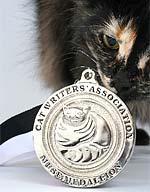 |
|||||||||||||||||||
|
|

We are the proud winners of the 2006 - 2009 winner of the Muse Medallion for Online Magazine by The Cat Writers? Association in their annual Communications Contest! (Photo courtesy of Weems Hutto).
On November 17, 2007 Felinexpress.com was honored to receive The President's Award by the Cat Writers' Association. We are very proud to have earned this distinction and will continue to provide quality information for all cat lovers.
Felinexpress.com Home > Cat Health > Feline Herpes |
Feline Herpes
Caused by the organism known as feline herpes virus 1 or (FHV-1) feline herpes is the scourge of the cat world causing acute upper respiratory infections in young and old cats alike. The upper respiratory system is the main pathway for germs to enter into the cat's body. Some of these germs are cast off by the cat’s immune system, but in other unvaccinated cats and specifically kittens, these germs can wreak havoc on a weakened system. Adults (especially those vaccinated against this disease) can generally shed off the disease in a few days. Kittens aren't so lucky, for some kittens these colds can be real killers.
Susceptible to the feline herpes virus are cats and kittens living in over-crowded conditions, highly stressful environments, and not being fed the proper diet. Cats who are not vaccinated against feline herpesvirus and kittens born from an infected queen. At risk are cats/kittens dealing with poor sanitation and ventilation problems, lactating queens, and sickly kittens /cats.
Symptoms such as sneezing, watery eyes, discharge from the eyes and nose, drooling, coughing, fever, cornea ulcers and loss of appetite can appear in feline herpes. These symptoms can sneak up suddenly either becoming barely noticeable, or they can manifest themselves in such a way that the cat will stop eating, become dehydrated, feverish, and lethargic. Untreated, the infection can build up behind the sinus passages and fill the passages with a thick enough discharge that the cat will be unable to breathe through his nose. When the virus reaches this stage, ulcers will begin to form on the cornea, and the eyes will become matted shut with goop. The kitten loses all interest in what is going on around him and spends the majority of his day feeling pretty miserable. The coat will become dull. Sometimes, the virus won't clear the system, The kitten can then suffer with dry eye, impaired vision, and chronic drainage from the nose and eyes for life. Worse case scenario, the kitten can become blinded from the irritation and scarring of the eyes or the kitten will die.
Because of the closed sinus passages, open-mouth breathing becomes the norm. Air bubbles form inside the kitten's system as he gulps in air in a desperate attempt to breathe. As more air is sucked in, the bubbles become larger. This can cause the organs to become compressed and further complicate the healing process. Catching this disease early is imperative (especially in young kittens).
Sometimes difficult to treat, because cats/ kittens who do not feel good generally dislike being handled, the treatment isn’t just one pill solving the problem. The kitten will need eye ointment such as Tri-Optic several times a day. Saline drops will also help to soothe irritated tissue and the saline (salt) will also help stop the spread of infection.Antibiotics are a must, along with Lysine, and vitamins A, C, and E. Often a coating agent such as barium or sucralfate is used to soothe aching throats and sore bellies. Fluids need to be pushed; food should be pureed so the kitten doesn't have to worry about friction burns in his throat. Eyes and noses should be gently wiped with a warm cloth several times a day to remove discharge. Litter boxes should be scooped several times a day and changed every other day during the contagious stage of the disease. Food and water bowls should be cleaned and scrubbed daily. The owner needs to wash her hands with an antibacterial soap after handling the kitten (especially if more than one kitten is involved). Vaporizers come in handy to aid the kitten in breathing. The owner must be diligent in washing hands after touching the kitten or handling anything the kitten has come into contact with.
Feline herpes virus is spread through cat-to-cat contact; touching noses, smelling rears, using soiled litter pans, sharing water and food bowls and even bedding can spread this persistent disease. The virus can attach to the owner's clothing, especially the shoes and socks and hands. Keep hand sanitizer in the room and use it every time you touch the kitten(s) or scoop and handle the litter pans oe pick up the food bowls. Keep an old set of clothing in the room and change into another set of clothes after each visit. Keep the contaminated clothes in a sealed plastic bag to stop the spread of this insidious disease. Use 3 ounces of bleach to a gallon of warm water and wipe down countertops, mop floors, and wash anything in the room the bleach won’t ruin on a daily basis. Make sure you take the infected kitten and put him in another room in a covered carrier while cleaning. Bleach up his nose, isn't going to help his breathing problem!
New kittens arriving in a home should be isolated from the resident cats before a vet check. Sick cats should be banned from having any sort of contact with the resident cats otherwise you could have a real epidemic on your hands. Feline herpes virus is not fatal, but there is no cure. Vaccinations will provide a iota of protection but they are not 100% effective. What you need to beat this disease is time, patience, the right medications, a good diet and good hygiene habits. Some kittens after battling feline herpes will kick it over time, but they might be carriers for life, these cats and kittens are known as latent carriers and are susceptible to other types of infections throughout their life.
More cat breeds |
|
? Copyright 2006-2010 Felinexpress.com, All Rights Reserved
Privacy Statement - Disclaimer - About Me


